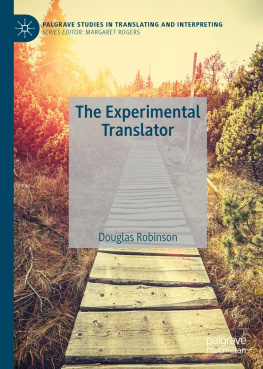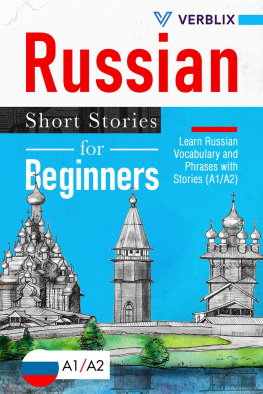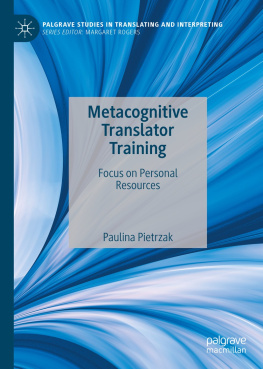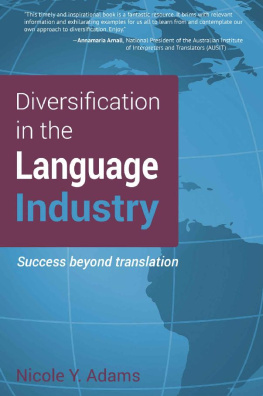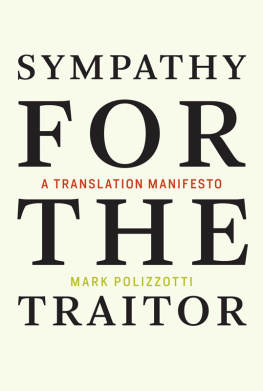Morry Sofer - Translator Self-Training: Russian - A Practical Coourse in Technical Translation
Here you can read online Morry Sofer - Translator Self-Training: Russian - A Practical Coourse in Technical Translation full text of the book (entire story) in english for free. Download pdf and epub, get meaning, cover and reviews about this ebook. year: 2011, publisher: Taylor Trade Publishing, genre: Home and family. Description of the work, (preface) as well as reviews are available. Best literature library LitArk.com created for fans of good reading and offers a wide selection of genres:
Romance novel
Science fiction
Adventure
Detective
Science
History
Home and family
Prose
Art
Politics
Computer
Non-fiction
Religion
Business
Children
Humor
Choose a favorite category and find really read worthwhile books. Enjoy immersion in the world of imagination, feel the emotions of the characters or learn something new for yourself, make an fascinating discovery.

- Book:Translator Self-Training: Russian - A Practical Coourse in Technical Translation
- Author:
- Publisher:Taylor Trade Publishing
- Genre:
- Year:2011
- Rating:3 / 5
- Favourites:Add to favourites
- Your mark:
- 60
- 1
- 2
- 3
- 4
- 5
Translator Self-Training: Russian - A Practical Coourse in Technical Translation: summary, description and annotation
We offer to read an annotation, description, summary or preface (depends on what the author of the book "Translator Self-Training: Russian - A Practical Coourse in Technical Translation" wrote himself). If you haven't found the necessary information about the book — write in the comments, we will try to find it.
Translator Self-Training: Russian - A Practical Coourse in Technical Translation — read online for free the complete book (whole text) full work
Below is the text of the book, divided by pages. System saving the place of the last page read, allows you to conveniently read the book "Translator Self-Training: Russian - A Practical Coourse in Technical Translation" online for free, without having to search again every time where you left off. Put a bookmark, and you can go to the page where you finished reading at any time.
Font size:
Interval:
Bookmark:
Any person who knows more than one language has the ability to explain a word or a sentence in what translators call the source language (the language you translate from) by using an equivalent word or sentence in what they call the target language (the language you translate into). This, in effect, is the beginning of translation. But it is only the beginning. It does not automatically turn a person into an accomplished translator. Along with the knowledge of the source and the target language, a translator must have an aptitude for translation. Some people are endowed with a talent for translation. It is not an acquired skill, like riding a bicycle. It is rather a talent, like playing the violin. Some people have it and some don't. It is not necessarily an indication of a lower or higher IQ. Nor is it an indication of how linguistically gifted one is. It is an inborn skill that enables a person to change a text from one language into another quickly and accurately, or, if you will, think in more than one language at the same time. If you possess this skill, then it behooves you to develop it and make use of it, because there is never an overabundance of good translators, and it is almost axiomatic that the good ones can always find either full-time or part-time work.
The first requisite for the working translator is a thorough knowledge of both the source and the target languages. There is no point in billing oneself as a translator if one is not fully familiar with both languages, or does not possess a vocabulary in both equal to that of a speaker of those languages who has a university education or its equivalent.
The second requisite is thorough at-homeness in both cultures. A language is a living phenomenon. It does not exist apart from the culture where it is spoken and written. It communicates not only the names of objects and different kinds of action, but also feelings, attitudes, beliefs, and so on. To be fully familiar with a language, one must also be familiar with the culture in which the language is used, indeed, with the people who use it, their ways, manners, beliefs and all that goes into making a culture.
Third, one must keep up with the growth and change of the language, and be up-to-date in all of its nuances and neologisms. Languages are in a constant state of flux, and words change meaning from year to year. A pejorative term can become laudatory, and a neutral term can become loaded with meaning. Thirty years ago the English word gay simply meant joyous. Now it is used to define an entire segment of society. We once spoke of the almighty dollar. Now as we travel abroad we may find out the dollar is not necessarily everyone's preferred currency.
Fourth, a distinction must be made between the languages one translates from and into. Generally speaking, one translates from another language into one's own native language. This is because one is usually intimately familiar with one's own language, while even years of study and experience do not necessarily enable one to be completely at home with an acquired language. The exceptions to this rule are usually those people who have lived in more than one culture, and have spoken more than one language on a regular basis. Those may be able to translate in both directions. There are also rare gifted individuals who have mastered another language to such a degree that they can go both ways. They are indeed extremely rare. Given all of this, one should allow for the fact that while the ability of the accomplished translator to write and speak in the target language (i.e., one's native tongue) may be flawless, that person may not necessarily be able to write excellent prose or give great speeches in the source language (i.e., the language from which one translates). Then again, it is not necessary to be able to write and speak well in the language one translates from, while it is to be expected that a good translator is also a good writer and speaker in his or her native language.
Fifth, a professional translator has to be able to translate in more than one area of knowledge. Most professional translators are called upon to translate in a variety of fields. It is not uncommon for a translator to cover as many as twenty or thirty fields of knowledge in one year, including such areas as political subjects, economics, law, medicine, communications and so on. Obviously, it would be hard to find a translator who is an economist, a lawyer, a medical doctor, and an engineer all wrapped into one. In fact, such a person probably does not exist. One does not have to be a lawyer to translate legal documents. Many a professional translator has been able to gain enough knowledge and acquire a vocabulary in a variety of technical fields to be able to produce perfectly accurate and well-written translations in those fields. This is not nearly as difficult as it may seem, since most technical fields utilize a well-defined number of terms which keep repeating themselves, and as one keeps translating the same subject, they become more and more familiar to the translator. One must, however, have a natural curiosity about many different areas of human knowledge and activity, and an interest in increasing one's vocabulary in a variety of related as well as unrelated fields.
Sixth, an effective translator must have a facility for writing or speaking (depending on whether the method used is writing, speaking, or dictation), and the ability to articulate quickly and accurately, either orally or in writing. Like a reporter, a translator must be able to transmit ideas in real time, and in good understandable language. Translation is a form of writing and speech-making, and a translator is, in a sense, a writer and an orator.
Seventh, a professional translator must develop a good speed of translation. There are two reasons for this: First, most clients wait until the last minute to assign a translation job. As a result, they turn to a translator or a translation service with what is perhaps the most typical question in this business: How soon can you have this job ready for me? The professional translator has to be prepared to accept that long job with the short turnaround time, or there will be no repeat business from that particular client or from most other clients, for that matter. Secondly, translation is generally paid by the word. The more words one can translate per hour, the more income one will generate. Translating 50 words per hour can land a translator in the poorhouse. Serious translation starts at 250 words per hour, and can reach as high as 1000 words per hour using word processing, and close to 3000 words per hour using dictation (the author actually knows such a translator). High volume translators are the ones who will be the most successful.
Eighth, a translator must develop research skills, and be able to acquire reference sources which are essential for producing high quality translation. Without such sources even the best of translators cannot hope to be able to handle a large variety of subjects in many unrelated fields. Dedicated translators are the ones who are always on the lookout for new reference sources, and over time develop a data bank which can be used in their work.
Ninth, today's translator cannot be a stranger to hardware, software, fax, modem, the Internet, and the latest developments in all those media. Translation has become completely dependent on electronic tools. Gone are the days of handwriting, the typewriter, and all the other prehistoric means of communication. The more one becomes involved in translation, the more one finds oneself caught up in the latest high-tech developments.
Tenth, a translator who wishes to be busy on a fairly regular basis doing translation work must carefully consider the fact that certain languages are in high demand, say, in Washington or in Los Angeles, while others are not. Thus, for example, there is high demand for Japanese, German, Spanish, French, Chinese, Italian, Russian and Italian in both Washington and Los Angeles, but not nearly as much for Bulgarian, Farsi, Czech, or Afrikaans. If your language falls within the second group, it is extremely advisable to also have language expertise in one of the languages of the first group, or to seriously consider whether your particular language has enough of a demand to warrant a major investment of time and effort on your part. One should always check and see what kind of a potential one's language specialty has in a given geographic area.
Font size:
Interval:
Bookmark:
Similar books «Translator Self-Training: Russian - A Practical Coourse in Technical Translation»
Look at similar books to Translator Self-Training: Russian - A Practical Coourse in Technical Translation. We have selected literature similar in name and meaning in the hope of providing readers with more options to find new, interesting, not yet read works.
Discussion, reviews of the book Translator Self-Training: Russian - A Practical Coourse in Technical Translation and just readers' own opinions. Leave your comments, write what you think about the work, its meaning or the main characters. Specify what exactly you liked and what you didn't like, and why you think so.

